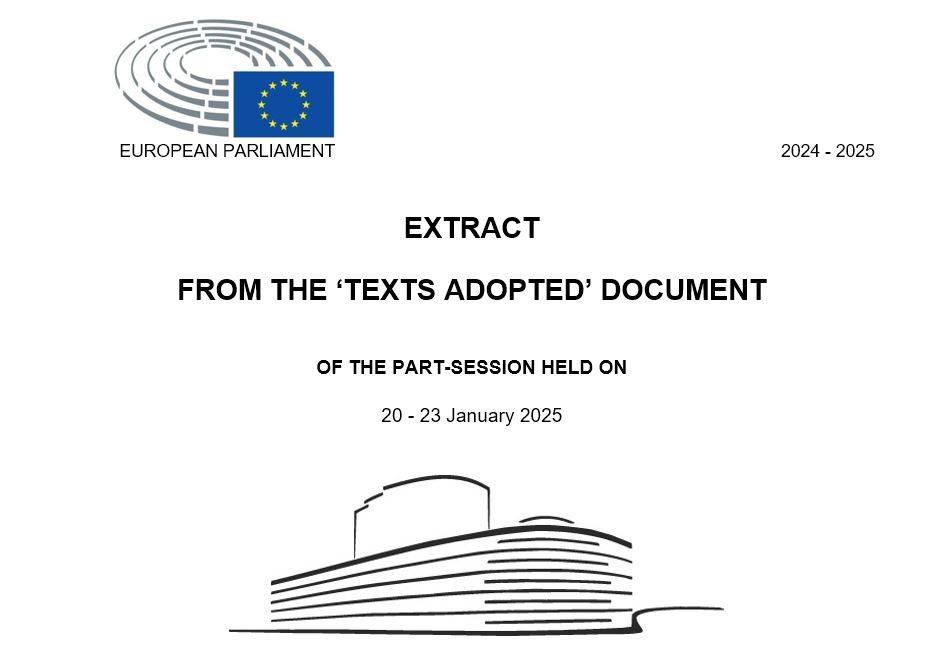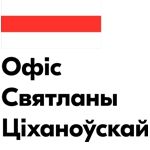
TEXTS ADOPTED
P10_TA(2025)0002
Need for actions to address the continued oppression and fake elections in Belarus
European Parliament resolution of 22 January 2025 on the need for actions to address the continued oppression and fake elections in Belarus (2024/3014(RSP))
The European Parliament,
- having regard to its previous resolutions on Belarus,
- having regard to the Council conclusions on Belarus of 12 October 2020 and 19 February 2024 and to the European Council conclusions on Belarus of 21 and 22 October 2021,
- having regard to the statements by the High Representative of the Union for Foreign Affairs and Security Policy of 1 August 2024 on the release of a number of political prisoners, and of 26 February 2024 on the parliamentary and local elections, and to the statement by the High Representative on behalf of the EU of 8 August 2023 on the third anniversary of the fraudulent presidential elections,
- having regard to the Universal Declaration of Human Rights, the UN Charter, the International Covenant on Civil and Political Rights and other international human rights instruments to which Belarus is a party,
- having regard to the report of the UN Office of the High Commissioner for Human Rights (OHCHR) of 25 March 2024 on the situation of human rights in Belarus in the run-up to the 2020 presidential election and in its aftermath,
- having regard to the resolution of the General Conference of the International Labour Organization (ILO) of 12 June 2023 concerning the measures recommended by the Governing Body under article 33 of the ILO Constitution on the subject of Belarus,
- having regard to Rule 136(2) and (4) of its Rules of Procedure,
- whereas the 30-year authoritarian rule of Aliaksandr Lukashenka in Belarus has been characterised by systematic repression of political opponents and dissent, including the enforced disappearance of Lukashenka’s critics; whereas since the fraudulent presidential election of August 2020, the illegitimate Lukashenka regime, with Russian support, has systematically repressed political activists, civil society, human rights defenders, lawyers, journalists, artists, religious leaders, trade unionists and other groups in Belarus and abroad, arbitrarily detaining tens of thousands of people;
- whereas following the fraudulent 2020 presidential election and the subsequent brutal crackdown, the EU and many of its democratic partners did not recognise the results of the elections or Aliaksandr Lukashenka as legitimate leader and President of Belarus;
whereas according to the Human Rights Centre ‘Viasna’, over 1 250 political prisoners remain detained in Belarus in conditions that put their lives at risk, and many of these prisoners are in fragile health; whereas several political prisoners have died in custody, four of them in 2024 alone; whereas political prisoners face torture, denial of medical care, restricted access to visits from lawyers and family members, and solitary confinement; whereas since the summer of 2020, 3 697 people have been recognised as political prisoners; whereas in 2024 alone, over 8 800 cases of politically motivated persecution were documented, including arrests, detentions, dismissals and other forms of repression targeting political prisoners, their families and lawyers, activists, journalists, priests, doctors, returning Belarusians and others; - whereas multiple international organisations, including the OHCHR, have documented systematic human rights violations in Belarus, including torture, arbitrary detentions, imprisonment or other forms of severe deprivation of physical liberty, enforced disappearances, persecution on political grounds and suppression of freedoms, which amount to crimes against humanity under international law; whereas in September 2024, Lithuania referred the situation in Belarus to the Office of the Prosecutor of the International Criminal Court (ICC) to investigate certain crimes against humanity committed by the Lukashenka regime;
- whereas the illegitimate Belarusian regime plans to hold sham presidential elections on 26 January 2025, with Lukashenka seeking a seventh term; whereas Belarus’ Central Election Commission has registered Lukashenka and four other pro forma ‘candidates’; whereas the current presidential election campaign is being conducted in an environment of severe repression which fails to meet even the minimum standards for democratic elections; whereas democratic candidates are barred from participating, media freedom is heavily restricted, voters face intimidation, and the absence of independent election observation further undermines the legitimacy of the electoral process;
- whereas both the parliamentary and local elections held on 25 February 2024 and the upcoming sham presidential election scheduled for 26 January 2025 exemplify the regime’s disregard for democratic norms as elections in Belarus are tightly controlled, with all candidates pre-approved by authorities, democratic parties eliminated and voters offered no real choice; whereas the election campaign has been marked by the detention of individuals involved in the 2020 presidential campaigns of other candidates and a clear readiness to harshly suppress dissent;
- whereas according to the Human Rights Centre ‘Viasna’, at least 360 people were detained between July and September 2024, and many democratic leaders, including Nobel Peace Prize Laureate Ales Bialiatski, Maria Kalesnikava, Viktar Babaryka, Pavel Seviarynets, Siarhei Tsikhanouski, Mikalai Statkevich and others remain imprisoned; whereas at least eight political prisoners are currently detained incommunicado;
- whereas the Lukashenka regime has stepped up pressure on the staff of Western diplomatic missions accredited in Belarus as well as other foreigners; whereas Mikalai Khila, a local member of staff of the EU delegation to Belarus, was apprehended by the Belarusian KGB in front of the EU delegation office, held in pre-trial detention from April 2024 and sentenced, in December 2024, to four years of imprisonment; whereas he has been listed as a political prisoner by the Human Rights Centre ‘Viasna’; whereas two Japanese citizens were recently detained on trumped-up charges of ‘agent activities’;
- whereas Lukashenka pardoned over 200 political prisoners in 2024 in an attempt to lift some Western sanctions; whereas political arrests continue despite these pardons, with at least 1 721 individuals convicted on political charges in 2024 alone;
- whereas the Federation of Trade Unions of Belarus has long been embedded in the Lukashenka regime’s government structure and is thought to play a significant role in organising the falsification of election results;
- whereas the Belarusian regime employs anti-extremism laws to obstruct media outlets, whereby most independent media have been labelled as ‘extremist’, with at least 45 media representatives detained, around 400 in exile and others facing harassment and mistreatment; whereas independent media, such as Belsat TV, Charter 97, Nexta, Radio Racyja, Radio Svaboda, Nasha Niva and others, play a crucial role in providing essential information and serving as a platform for democratic voices; whereas the Belarusian authorities employ surveillance, online censorship and disinformation, escalating digital authoritarianism and undermining the prospects for free and fair elections in 2025; whereas Belarusian propagandists regularly spread disinformation about EU Member States and their officials and suppress access to information;
- whereas more than 500 000 Belarusians have been forced to flee the country since 2020, with some continuing to face persecution from the Lukashenka regime, including through trials in absentia, threats from the security forces and pressure on relatives, confiscation of property and other restrictions;
- whereas under Lukashenka, more than 250 people sentenced to death have been executed; whereas Belarus remains the only country in Europe and Central Asia to retain the death penalty, with its scope expanded in 2022 to include vaguely defined acts of terrorism and in 2023 to include ‘treason against the state’;
- whereas repressive measures in Belarus have increasingly targeted religious freedom, with the recent adoption of the law on freedom of conscience and religious organisations posing a serious threat to the rights and existence of religious communities; whereas this crackdown has also targeted religious leaders, as seen in the recent sentencing of Catholic priest Reverend Henrykh Akalatovich to 11 years in prison on fabricated high treason charges, the first such case against Catholic clergy in Belarus;
- whereas the Lukashenka regime has proven to be instrumental to Putin by providing Russian forces with access to Belarusian territory from which to mount the full-scale invasion of Ukraine; whereas the Lukashenka regime commits crimes against Ukrainian children, including hosting re-education camps for political indoctrination and militarisation; whereas it assists attempts by Russia and others to destabilise the EU and undermine European aspirations among the EU’s neighbours, notably by weaponising migration at the EU’s borders and legitimising Bidzina Ivanishvili’s autocratic regime in Georgia;
- whereas the EU has imposed targeted sanctions on Belarus in response to the fraudulent 2020 elections, systematic human rights violations, and Belarus’s complicity in Russia’s war of aggression against Ukraine, including trade restrictions and sanctions on 287 individuals, among them Lukashenka, and 39 entities;
- whereas the Lukashenka regime, with Russian assistance, circumvents some of these sanctions through preferential market access and the use of Russian infrastructure; whereas reports indicate that BelAZ, a sanctioned Belarusian producer of trucks, circumvents sanctions by disassembling trucks in Belarus and shipping the parts to the EU for reassembly under different brand names;
- Reiterates its non-recognition of the election of Aliaksandr Lukashenka to the post of President of Belarus; considers the current regime in Belarus to be illegitimate, illegal and criminal; reaffirms its unwavering support for the Belarusian people in their pursuit of democracy, freedom and human rights;
- Denounces the lack of freedom, fairness and transparency ahead of the so called presidential elections in Belarus and calls for the EU, its Member States and the international community to categorically reject the upcoming elections in Belarus and the run-up campaign as a sham, as they do not meet minimum international standards for democratic elections; calls for the EU, its Member States and the international community to continue not to recognise the legitimacy of Aliaksandr Lukashenka as president after 26 January 2025, and calls for free and fair elections to be held in Belarus;
- Deplores the ongoing grave violations of human rights and democratic principles in Belarus, which have further intensified in the run-up to the so-called presidential elections; condemns the systematic repression in Belarus, which includes arbitrary arrests, torture, harassment, ill-treatment of detainees, persistent impunity and a structural lack of respect for due process and fair trials; reiterates its demand for the immediate and unconditional release of all individuals detained in Belarus for their political views, alongside compensation and the restoration of their rights; demands an end to the repression of political opponents and the Belarusian public;
- Reiterates its calls on the Belarusian authorities to respect detainees’ rights, provide medical care and grant access to lawyers, families, and international organisations;
- Expresses grave concern about the situation of political prisoners, including Maria Kalesnikava, Siarhei Tsikhanouski, Ales Bialiatski, Mikalai Statkevich, Mikalai Khila, Valiantsin Stefanovich, Maksim Znak, Viktar Babaryka, Ihar Losik, Andrzej Poczobut, Palina Sharenda-Panasiuk, Uladzimir Matskevich, Marfa Rabkova, Uladzimir Labkovich, Aliaksandr Yarashuk, Volha Brytsikava, Aliaksandr Kapshul, Yana Pinchuk, Mikalai Bankou, Andrei Navitski, Henrykh Akalatovich, Uladzimir Kniha Dmitry Kuchuk, Pavel Seviarynets and others, many of whom are facing severe health issues without access to proper medical care, and are enduring isolation, ill treatment and torture;
- Considers the arrest and sentencing on politically motivated charges of Mikalai Khila, a local staff member of the EU Delegation in Minsk, a breach of diplomatic practices towards the EU; calls for the EU and its Member States to swiftly develop a credible response;
- Commends the resilience of Belarusian civil society and democratic forces; reiterates its solidarity with the people of Belarus and its support for their legitimate aspirations for a democratic and European future; expresses solidarity with Belarusian democratic forces and civil society organisations in their efforts to establish a sovereign, democratic and prosperous Belarus; remains committed to working with democratic forces, civil society and independent media to the benefit of the people of Belarus;
- Calls for the EU and its Member States to continue to investigate human rights abuses in Belarus and to support accountability measures, including through universal jurisdiction; calls for the EU and its Member States to investigate, on the basis of universal jurisdiction, the crimes against humanity committed by the Lukashenka regime in Belarus and on EU territory and, following Lithuania’s example, to refer the situation in Belarus to the International Criminal Court for investigation to the extent possible, and to consider the establishment of an international tribunal to prosecute the crimes of the Lukashenka regime; calls on the Member States to allow Belarusian lawyers expelled by the regime to practise on EU territory in order to provide legal assistance to persecuted Belarusians;
- Highlights the invaluable work carried out by human rights defenders and civil society representatives in Belarus in monitoring, documenting and reporting the grave human rights violations and crimes against humanity that are taking place in the country, in order to ensure subsequent accountability and justice for the victims;
- Reiterates its call for the EU and its Member States to support political prisoners and their families, including by demanding proof of political prisoners’ whereabouts, requesting their release, simplifying the procedures for those fleeing Belarus to obtain visas and identity documents, and providing rehabilitation and other types of support; calls on the EU Delegation and the Member State embassies in Belarus to continue observing and monitoring the trials of all political prisoners;
- Stresses the importance of protecting exiled Belarusians from persecution by the Lukashenka regime, and of granting them opportunities to legally stay and work in the EU; calls for the EU and its Member States to raise the issue of abuse of international arrest warrants within Interpol and calls on the countries concerned not to extradite Belarusian citizens who have fled the regime and will face persecution upon their return to Belarus;
- Deplores the fact that repressive measures in Belarus have expanded to include attacks on religious freedom, through the adoption of the law on freedom of conscience and religious organisations, which grossly violates the fundamental right to freedom of religion, conscience and belief; urges the Lukashenka regime to immediately halt the persecution of religious communities and churches;
- Calls for the continuation of EU support for Belarusian democratic forces, led by Sviatlana Tsikhanouskaya; reiterates the need to support Belarusian democratic forces, civil society, students, journalists, leaders of trade unions, exiled professionals and others by providing them with visas, scholarships, grants and networking opportunities; encourages the representatives of the democratic forces of Belarus to maintain and promote unity;
- Denounces the Lukashenka regime’s complicity in Russia’s war of aggression against Ukraine and condemns its deliberate subordination of Belarus to Russia in a so-called union state encompassing political, geopolitical, economic, military and cultural spheres; reiterates the need to contribute to strengthening Belarusian national identity and the Belarusian language, and to combat the distortion and manipulation of Belarusian history by the Lukashenka regime as well as by the Kremlin and its proxies;
- Urges the EU and its international partners to broaden and strengthen sanctions against individuals and entities responsible for the repression in Belarus and for Belarus’s participation in Russia’s war of aggression against Ukraine, while closing sanctions loopholes and addressing the main sources of income financing the regime, such as exports of potash and other fertilisers; calls for the EU to sanction Belarusian entities and individuals responsible for the forced labour of political prisoners, as well as the goods produced using such forced labour;
- Urges the EU and international partners to immediately identify, freeze, and find legal pathways for seizing assets of the Belarusian leadership and related Belarusian entities involved in the Russian war effort, as well as assets of entities and individuals leading Lukashenka’s so-called election campaign, including the Federation of Trade Unions of Belarus, such as Yury Sianko, Hanna Varfalameyeva and Valery Kursevich; calls on EU and Western companies to cease their activities in Belarus;
- Calls for the EU and its Member States to continue raising the situation in Belarus in all relevant international organisations, in particular the Organization for Security and Cooperation in Europe, the UN and its specialised bodies and the ILO, with the aim of enhancing international scrutiny of the human rights violations and international action on the situation in Belarus; calls on the Member States to ensure continued documentation and accountability for international crimes committed by the Lukashenka regime, strengthen the OHCHR’s examination of the human rights situation in Belarus by providing full support to the UN Group of Independent Experts on the Human Rights Situation in Belarus and by preserving the mandate of the UN Special Rapporteur on the situation of human rights in Belarus to monitor ongoing human rights violations;
- Denounces the illegal transfer of several thousand children, including orphans, from Russian-occupied areas of Ukraine to so-called recreational camps in Belarus, where they are subjected to Russification and indoctrination; strongly condemns the involvement of the Belarus Red Cross in the illegal deportation of Ukrainian children;
- Strongly condemns the Lukashenka regime’s weaponisation and instrumentalisation of migration to destabilise neighbouring EU Member States through orchestrated irregular flows, violating human rights, exploiting vulnerable individuals and threatening regional stability; calls for the EU and its Member States to work on a coordinated response to counter this hybrid threat while protecting EU external borders and protecting the rights and safety of vulnerable individuals;
- Urges Belarus to commute all death sentences, impose a moratorium on capital punishment and move towards its permanent abolition;
- Instructs its President to forward this resolution to the Vice-President of the Commission / High Representative of the Union for Foreign Affairs and Security Policy, the relevant EU institutions, the governments and parliaments of the Member States, the Organization for Security and Co-operation in Europe, the Council of Europe, the UN High Commissioner for Human Rights, the Government of Japan, representatives of the Belarusian democratic forces and the Belarusian de facto authorities.



